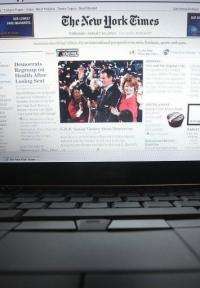NY Times executives discuss plan to charge online readers

Top New York Times executives expressed confidence Friday that a plan to start charging readers of the newspaper's website from next year will not result in a significant loss of traffic.
"We are, and have been for quite a long time, the largest newspaper-owned website in the world," said Martin Nisenholtz, the senior vice president for digital operations at the Times.
"We intend to remain the largest newspaper-owned website in the world," Nisenholtz said at "paidContent 2010," a day-long conference here hosted by technology and media website paidContent.org.
The Times Co. announced last month that it would begin charging readers of NYTimes.com in early 2011, using a "metered model" that will offer users free access to a set number of articles before they will be asked to pay.
"We have reached a point where we have enough scope and scale to make this move," Nisenholtz said, adding that the goal is to "maximize overall revenue" through online subscriptions and online advertising.
"The metered model will allow us to remain a very, very large website at the same time as we get a second revenue stream," he said.
Nisenholtz, Times Co. chairman Arthur Sulzberger and Times Co. president and chief executive Janet Robinson answered questions about the plan during a panel discussion at paidContent 2010 but revealed few new details.
Their move is being closely watched by others in a US newspaper industry faced with declining print advertising revenue, falling circulation and the migration of readers to free news online.
The Wall Street Journal and Long Island's Newsday are currently the only major US newspapers charging readers for full online access.
A number of other US publishers are considering the move but fear it may drive readers away and result in a loss of revenue from online advertising.
"We believe the direction we're headed is going to be the direction that quality information, and maybe not quality information, is going to be going," Sulzberger said.
"It's a question of seeing what works, adapting it, making it work better," he said. "This is the next step on a journey of transformation."
Sulzberger cautioned that charging readers may not be for everybody.
"The answer we're coming up with is not necessarily the right answer at this moment in time for other news organizations. There are other opportunities that might work for them," he said.
"This is an answer, we believe, for The New York Times in its particular place in society in the United States and globally," he said.
The executives defended the newspaper's last experience with making readers pay, a system called TimesSelect which involved putting columnists and editorials behind a pay wall. TimesSelect was aborted after 18 months.
"It was not a failure," Robinson said. "It proved that people were willing to pay for content, certainly of a premium nature."
"We were making good money off of TimesSelect," Sulzberger added. "We simply knew we could make more by taking it down."
Nisenholtz declined to specify how many users the Times had determined would be ready to pay for the newspaper online.
"The research tells us that a sufficient number of users are open to the idea to make this a viable model," he said. "That's all we're going to say."
Citing Nielsen figures, Nisenholtz said NYTimes.com receives about 21 million unique visitors a month from the United States and "some will pay because they're heavy users of our site."
Nisenholtz also said the Times' currently free Apple iPhone application had been downloaded 3.2 million times and would likely be included in the metered model when NYTimes.com begins charging next year.
(c) 2010 AFP



















